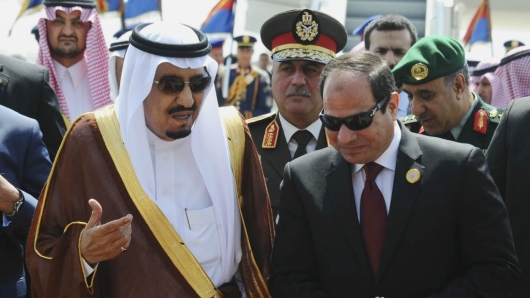Trump Shifts 2 Mid-East Peace Obstacles: Saudis Will Amend Peace Plan, Netanyahu Will Cede Land
On Tuesday, March 28, debkafile carried this exclusive report:
If the Arab summit opening in Amman Wednesday, March 9 meets expectations in Washington and Jerusalem, the session will ratify a pivotal initiative for promoting an historic peace process between the Arab world and Israel. This effort, which matured through five months of mostly secret diplomacy, was launched by Donald Trump in November, shortly after he was elected US President.
Outside the official Arab summit agenda … the rulers will quietly discuss off-stage a proposal brought by Saudi King Salman and Egyptian President Abdel-Fatteh El-Sisi to embark on steps destined to lead to peaceful relations between the moderate Arab regimes and Israel and exponentially to a resolution of the Israeli-Palestinian conflict. President Trump and Saudi Deputy Crown Prince Mohammed bin Salman crafted this proposal at the White House on March 14.
DEBKA Weekly can now fill in the details of this proposal.
It was hammered out in a deal: US President Donald Trump agreed to ramp up US military intervention against Riyadh’s archenemy, Iran, in the Gulf, the Arabian Peninsula, Iraq and Syria.
In return, Saudi Arabia made the following concessions, which are beginning to emerge:
1. Thursday, March 30, Saudi Aramco formally appointed JPMorgan Chase & Co, Morgan Stanley and HSBC as international financial advisers for its initial public offering of up to 5 percent, expected to be the world’s biggest share sale. Its purpose is to raise cash for the Saudi royal prince’s Vision 2030 economic development program.
This concession substantially expands Saudi-US ties with a large benefit for the US economy.
The other Saudi concessions were designed to promote Trump’s Middle East peace vision.
2. Amendments of the original Saudi peace plan of 2002. Instead of making the peace process between the Arab world and Israel contingent on a resolution of the Palestinian dispute, the two processes may be separated to remove a major historical obstacle to both.
3. The Arab governments may start developing normal relations with Israel without regard to progress – or lack thereof – on the Palestinian issue.
4. Riyadh, Cairo and Dubai agreed to expunge from the Saudi peace plan the demand for an Israeli withdrawal to the pre-1967 war lines as a pre-condition for peace negotiations. They agreed to be satisfied with an Israeli commitment to cede “areas of the West Bank.” The three Arab governments accepted the premise that the clock can’t be turned back to compel Israel’s return to the pre-war boundaries. This issue will be determined in direct negotiations between Israel and the Palestinians.
Prime Minister Binyamin Netanyahu has signified publicly that, in return for an amended Saudi peace plan, he would agree to an Israeli withdrawal from parts of the West Bank and the relocation of some of the Jewish settlements to the areas remaining in Israel’s hands.
A joint American-Israeli commission has been at work for some weeks on guidelines for negotiations on Israel settlement construction, including new locations to be enclosed in the areas remaining under Israeli dominion. No final decisions have yet been reached.
Israel is represented on the panel by Netanyahu’s senior adviser, Yizthak Molcho, and its Ambassador to Washington, Ron Dermer. They are being pushed hard by Trump officials for more far-reaching concessions than Netanyahu is currently ready to grant.
On the Arab side, Arab League Secretary-General, the former Egyptian foreign minister Ahmed Aboul-Gheit has been appointed by King Salman to act alongside Egyptian President Abdel-Fatteh El-Sisi as liaison with the Trump administration for the unfolding peace initiative.
The current Egyptian Foreign Minister, Sameh Hassan Shoukry is in charge of interaction among Arab rulers, including the Palestinian leaders. The live wire keeping all the players on the move is former British Prime Minister Tony Blair. He is the unofficial super-coordinator and troubleshooter for fixing difficulties holding up the process as they come up.
When they canvassed Arab League rulers, Shoukry and Blair found only two flatly opposed to the new Arab-Israeli peace initiative: Iraq’s Prime Minister Haidar al-Abadi and Algerian President Abdelaziz Bouteflika.
President Trump tried to talk Abadi round to the plan when they met at the White House this week. He failed because the Shiite Iraqi prime minister was scared of Iran’s long arm and pervasive influence in Baghdad.
Jordan’s King Abdullah, as the host of the Arab Summit, travels to Washington after the session to brief Trump on its outcome. The monarch is taking good care meanwhile to preserve a neutral façade on the new peace initiative.


